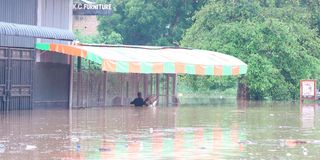Tourists stuck in hotel rooms due to rains

A flooded section of the Majaoni-Utange-Bamburi road in Mombasa County on November 17. Some hotel operations have been disrupted by the ongoing heavy rains.
Imagine going on a holiday to unwind along the beach only to get stuck in your hotel room. This is the situation many tourists have had to contend with for the past five days following heavy rains linked to the El Nino phenomenon.
The rains have caused floods across the country, forcing hoteliers to stop outdoor activities. On Friday, some areas of Sarova Whitesands Hotel in Mombasa, were flooded, forcing staff to use vehicles to ferry snacks to more than 300 visitors who were attending a conference. The guests were stuck at the conference facility waiting for the waters to subside.
At Pride Inn Paradise Beach Resort, guests attending conferences were also stuck in various rooms due to the heavy rains.
While the hoteliers have not received any cancellations, they are worried that if the situation persists, tourists might cancel their travel plans. They are already receiving inquiries from tourists about the weather.
“Mombasa is a beach destination. People travel for relaxation on the beach. So with all these weather issues, we will receive cancellations, but we are hoping for the best,” said Kenya Association of Hotelkeepers and Caterers Coast Executive Officer Sam Ikwaye.
“We have challenges in bookings due to the road connectivity, especially in North Coast, due to the construction of the Mombasa-Malindi highway at the Bamburi stretch where we witnessed floods. Visitors had to leave hotels earlier than usual not to miss their flights,” he added.
The tourism expert said stakeholders met with Kenya National Highways Authority officials to find a solution to the challenge of traffic congestion.
“We need to ease traffic. If there is any snarl-up, our tourists get stuck. Floods cause delays, hamper movements and we end up delaying our visitors from catching flights. We are worried things might worsen in December when the sector is at its peak,” he said.
Dr Ikwaye said the rains have also hampered food supplies. Most hotels buy their foodstuffs from Kongowea market, which was also flooded.
“Diani hotels get their food supplies from Kongowea, which is then transported using the ferry, so this is causing operational challenges at the facilities,” Dr Ikwaye said.
Diani Hospitality Owners Association chairperson Mohammed Hersi said that some of the floods witnessed in North Coast hotels have been caused by road construction.
“We appreciate road construction but it must happen with a contingency plan, especially on how to deal with floods. So they are not making diversion roads, no plans to deal with flood water, so it’s a problem. They forget there are businesses along the highway,” he said.
An official of the Kenya Association of Tour Operators, Ms Monica Solanki, said the flooding was yet to turn into a crisis for them.
“The floods have affected some roads for instance the Rombo road between Amboseli Loitoktok going to Taveta. Sala Gate Road was also impassable. But with the sun coming up we hope the situation changes. We cannot lie to our visitors that it isn’t raining and we cannot risk people to go for safari when it’s dangerous,” said Ms Solanki.
This comes as the sector was bouncing back, with hotels recording occupancy at over 90 per cent.





